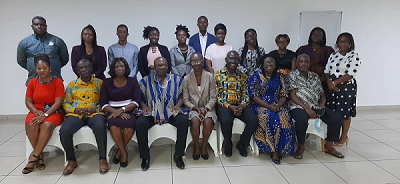
Multi-stakeholder forum to promote gender-sensitive rural advisory services in Ghana formed
Under the auspices of the Centre for Agriculture and Bioscience International (CABI) PlantwisePlus Programme, in collaboration with the Women in Agricultural Development (WIAD and the Directorate of Agricultural Extension Services (DAES) of the Ministry of Food and Agriculture (MoFA), a multi-stakeholder forum has been established to advocate and provide directions for addressing gender gaps in rural advisory services in Ghana.
The overarching aim of the forum is to help bridge gaps in agricultural productivity in Ghana emanating from gender inequalities in the delivery and access to agricultural advisory services. The forum comprises representatives from all relevant public and private sector institutions involved in gender issues.
Advertisement
The forum is expected to be a key advocacy platform where members representing their respective institutions would engage in knowledge and experience sharing dialogue aimed at discussing high-level policy related actions needed to address gaps in rural advisory services and commit to jointly-agreed activities desired changes and outcomes.
Women farmers
The CABI’s work within the Plantwise programme in Ghana and other countries has shown women farmers not only have limited access to rural advisory services, but most of these services are also geared towards the needs of male farmers, with limited relevance to the needs of women farmers.
This gender gap, along with women’s limited access to agricultural inputs, contributes to the gender gap in agriculture productivity in developing countries, where women-managed farms are 20-30 per cent less productive than farms managed by men.
According to the Food and Agriculture Organisation (FAO), closing this gap would help to boost agriculture production by 2.5-4 per cent, improve food security and welfare of rural households.
In the context of its new PlantwisePlus programme which aims to enhance the knowledge and uptake of climate-smart plant health practices through responsive digital advisory tools, CABI conducted a study in 2021 to understand what works in designing and delivering gender sensitive extension advisory services in Ghana and to shed light on areas where improvement is required in existing services in order to increase their gender sensitivity.
The study came out with multiple findings cutting across different levels of the extension delivery system in Ghana from the policy and enabling environment down to the community and individual farmer level.
Speaking at the maiden meeting of the forum in Accra on May 18, 2022, the Regional Representative of CABI West African Centre (WAC), Dr Victor Attuquaye Clottey, said it was expected that the forum through diverse dialogue and advocacy engagements, could influence, stimulate and help pursue policy actions that would bring about changes in the national extension delivery system.
“Such changes in a way should ensure that women benefit equitably from rural advisory services and are enabled to contribute their due to Ghana’s agricultural development,” he said.
Through the discussions at the maiden meeting, the forum has outlined key action areas its members have committed to pursue in the coming months in order to help improve the current situation of gender in rural advisory services (GRAS). Such areas include advocacy for policy enforcement, stakeholder awareness raising and capacity building of key actors.




